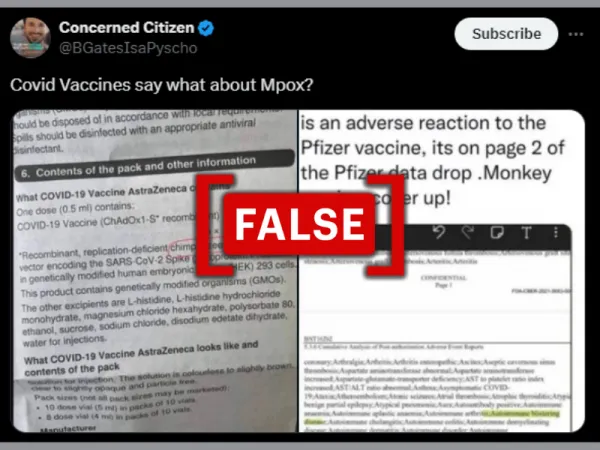By: Karin Koronen
August 15 2024
 Source: X/ Screenshot/ Modified by Logically Facts
Source: X/ Screenshot/ Modified by Logically Facts
No evidence links the chimpanzee adenovirus vector in AstraZeneca's vaccine to mpox, and mpox is not the same as the autoimmune blistering disease.
Context
The X, formerly Twitter, account @concernedcitizen, which has over 530,000 followers, recently posted two photos with the caption "Covid Vaccines say what about Mpox?."
The first photo underlines chimpanzee adenovirus as a component in the AstraZeneca vaccine, while the second claims, "Autoimmune blistering disease is an adverse reaction to the Pfizer vaccine, its on page two of the Pfizer data drop. Monkeypox is a cover-up!" (archived here).
The second photo includes a screenshot from a document, highlighting "the autoimmune blistering disease" within the text. The post was made shortly after the World Health Organization announced Mpox as a global health emergency.
Another person tweeted, "Who is surprised that after millions of people have been injected with genetically modified chimp virus, there is now an outbreak of monkeypox?" (archived here). Many others have shared similar claims (archived here, here, and here).
To summarize, these posts make two false claims: first, that the AstraZeneca vaccine contains chimpanzee adenovirus and insinuates a link with mpox, presumably due to the similarity between the two names, and second, that "the autoimmune blistering disease" listed in a Pfizer vaccine document as a possible side effect is mpox.
In fact
The AstraZeneca vaccine uses a modified adenovirus that infects chimpanzees (chimpanzee adenovirus) but is harmless to humans. This virus is engineered to carry genetic material from the SARS-CoV-2 virus, which causes COVID-19, to stimulate an immune response. Conversely, the Mpox virus belongs to an entirely different genus called the Orthopoxvirus in the Poxviridae family. Adenoviruses and poxviruses are unrelated in structure, genetics, and how they infect hosts.
Adenovirus vectors, including the chimpanzee adenovirus, have been widely studied and used in vaccine development. They have been deemed safe as they cannot replicate in human cells. Due to biological distinctiveness, there is no mechanism by which an adenovirus vector could cause mpox. Moreover, no evidence from clinical trials, vaccine surveillance, or epidemiological studies links the AstraZeneca vaccine to mpox.
Mpox has been recognized as a distinct viral infection since 1958, long before adenovirus-vector vaccines like AstraZeneca were developed. Recent outbreaks are linked to human-to-human transmission and contact with infected animals, not vaccines. So far, they have primarily affected the Democratic Republic of the Congo. Additionally, chimpanzees are not monkeys.
The other claim that mpox is the same as autoimmune blistering disease (ABD), listed among the suspected adverse effects of Pfizer's COVID-19 vaccine, is also false. The vaccine contains no live virus, as it is entirely synthetic. The two differ in causes, symptoms, and treatments.
Reuters, RMIT University, and AP News have also debunked the claim that the chimpanzee adenovirus in the AstraZeneca vaccine causes mpox. Furthermore, the U.K. government clarified this in 2021.
Logically Facts has previously debunked other claims about the COVID-19 vaccine, such as the COVID-19 vaccine causing ALS, the COVID-19 vaccine causing infertility, and that 331 babies died in COVID-19 vaccine trials.
The account that posted the claim has previously been linked to various types of misinformation. For example, Logically Facts has debunked a video that was shared with a false claim that it shows a teacher teaching kids about pronouns.
The verdict
Although the AstraZeneca vaccine contains chimpanzee adenovirus, there is no link with mpox, as the two are biologically different entities. The claim that mpox is an autoimmune blistering disease linked to the Pfizer vaccine is also false.